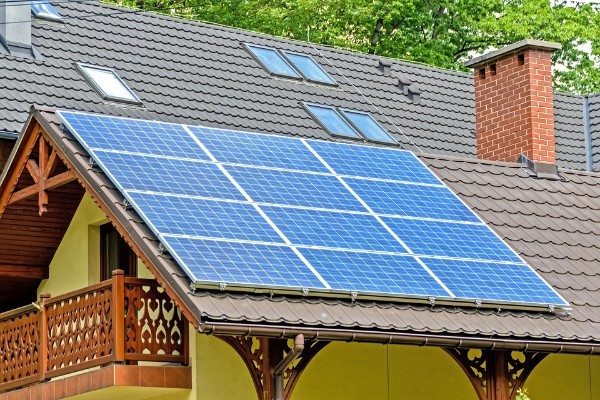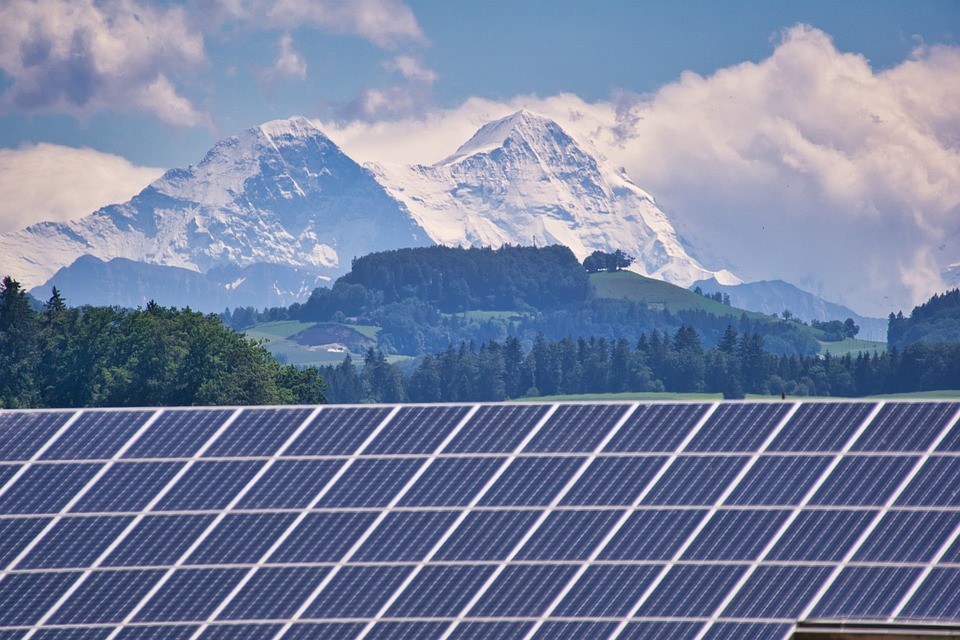You must first determine whether solar energy is a trustworthy source of energy before making an investment. There are doubts about the viability of solar energy and its ability to supply your home with energy continuously.
Since it has been adopted widely, solar energy has shown to be a more dependable energy source than fossil fuels. Solar power is a dependable energy source because its parts have lengthy warranties and infrequent failure rates. Additionally, it benefits your wallet, which is another advantage. Solar energy efficiency is a long-term investment that generates free electricity and can help you reduce your monthly expenses.
How Is Solar Energy Produced?
The term “solar energy” describes the energy that the sun produces. With the help of solar panels, we can convert this energy into usable electricity. The silicon photovoltaic (PV) cells that make up each panel allow electrons to flow when sunlight strikes the cell’s surface. Electrons are all that electricity really is—a flow of them.
The DC electricity from the panels is then converted into AC electricity that can be used in your home by a solar inverter, which is where the electricity initially flows. The efficiency of the panel is the proportion of light that is converted into electricity; most solar panels have an efficiency of 15–18%. To produce the desired amount of power, high-efficiency panels use photovoltaic cells of higher quality and take up less space.
How Will Solar Energy Work Without Sunlight Or At Night?
Due to their dependence on the sun, solar panels will be less effective at producing energy during the winter and summer months. Luckily, there are two easy ways to overcome this obstacle:
- Net metering: Under a law known as net metering, utilities are required to pay people who export extra solar energy to the grid. Most of the time, you’ll receive credit at the same cents per kilowatt-hour rate at which you buy electricity.
- Batteries: Your home will be powered by the batteries at night after being charged all day by the solar panels.
Most of the time, homeowners choose not to integrate batteries into their solar power system. This is due to the fact that net metering enables you to utilize your solar energy’s economic value without making a significant financial investment in batteries.
The sun offers an endless supply of energy that does not harm the ozone layer or the environment. In addition to preserving the environment, solar energy would help reduce the need for limited and nonrenewable energy sources. As a result, solar energy is regarded as a dependable energy source and a wise financial decision for the future of the planet.
Why Is Solar Energy Reliable
Increased Productivity
Solar panels are more affordable. In recent years, solar panels and batteries have improved in affordability, availability, efficiency, and robustness. They also offer energy security and peace of mind as opposed to conventional power, which frequently goes out during rainy or stormy weather.
Cost-effective
By compensating for your electricity costs, solar panels can help you save money. Solar panels made by Surface Solar Systems are intended to replenish the energy produced by solar radiation. It would do away with the unpredictability, inconvenience, and costs related to diesel generators and gas refueling. As a result, installing solar energy for your home will result in consistent efficiency and cost savings throughout the year.
Controlling The Power Source
Your home’s solar power system gives you control over your electricity supply and the freedom to use it without relying on conventional sources, which are liable to go down at any time. One will directly supply your home’s power appliances during the daytime with the electricity produced by solar panels.
The energy kept in the solar system’s batteries during the night may still be used by the appliances. In this way, solar panels can assist you in achieving energy independence and developing into a reliable energy source.
Renewable Energy Source
One source of renewable energy is solar power. It assists you in reducing your reliance on fossil fuels like coal, natural gas, and oil. These energy sources release hazardous emissions that can contaminate the soil, water, and air. Burning fossil fuels does not promote environmental benefits and contributes to global warming. On the other hand, solar energy doesn’t harm the environment.
The sun offers an endless supply of energy without harming the ozone layer or the environment. In addition to preserving limited and nonrenewable energy sources, solar energy would also help to safeguard the environment. In light of this, solar energy is regarded as a dependable energy source and a wise investment in the future of the planet.

What Happens If My Solar Panels Fail?
Your solar panel warranties, which typically last 25 to 30 years, will likely cover you if one or more of them fail. Both a performance warranty and a product warranty are frequently included with solar panels. Any flaws in the panel’s construction or material will be covered by the product warranty. The panel’s performance will remain above a predetermined degradation rate, according to the performance warranty.
The defective panel will probably be replaced as long as you didn’t do anything to void the warranty (such as clean your panels with a power washer), though this might not include labor to take out the defective panel and put in the new one.
Is there a way to monitor your solar system so you don’t miss out on energy savings from broken machinery? Examine the monitoring software for your solar system or examine your electric bills in-depth.
Many utilities break down how much electricity you used each month and how much you drew from the grid. It’s possible that your solar system is producing less electricity because of a problem if you bought significantly more electricity from the grid one month than you usually do.
Make sure the increase in your electricity bill wasn’t the result of a justifiable increase in your energy consumption, such as Christmas lights or a new piece of equipment.
How Reliable Is Other Solar Equipment?
To convert sunlight into electricity, you need more than just solar panels. The main components of solar systems are solar panels, inverters, racking, distribution panel, and electric meter.
Additionally covered by warranties are the inverters, which are the component of your solar system that transforms the DC electricity from your panels into usable AC electricity. Typically, these warranties range from 10 to 25 years. Even though this component of the system might be the most susceptible to problems, choosing a high-quality model from a reputable brand can help you avoid a lot of future hassles and time-consuming tasks.
Batteries are an optional add-on for solar storage and typically have five to ten-year warranties. Depending on how often they are charged and discharged, batteries have a much shorter lifespan than other solar system components.
The racking, which holds your solar panels to your roof or ground, typically comes with a 10 to 20-year warranty against manufacturing and material flaws.
All of this is to say that manufacturer warranties might be available to cover any issues that arise with your system. But it’s also a smart idea to work with a solar installer who provides extra warranties and guarantees.
For the first ten years, Paradise Energy offers a Triple Ten Guarantee, which includes a workmanship guarantee for work we performed, system monitoring, and the jewel in the crown—a performance guarantee that backs up the system’s overall solar production. The difference will be paid to you if your system doesn’t produce as much as we promised.

Is Solar Energy A Safe Investment?
The vast majority of the time, solar is not a risky investment. The opposite is true for many, in fact. As it is only reliant on a small number of largely predictable factors, solar energy can be a very stable and reliable investment.
The value of your solar investment will depend on two factors: the rate at which electricity prices rise and the output of your system.
Look at your proposal first and foremost. The majority of solar installers will also include an ROI and a cash flow chart illustrating the system’s payback. These numbers have significance.
Electricity prices will likely rise over the course of your system’s 30-plus-year lifespan, even though it’s impossible to predict with any degree of accuracy whether they will rise or fall. Electricity prices on the grid will rise as expensive infrastructure must be expanded to meet the rising demand.
The payback of your system is significantly influenced by the weather in addition to electricity prices. If your system produces less electricity over several exceptionally cloudy and snowy years, it will take longer to pay for itself. However, bright and sunny weather will supercharge your system, resulting in an above-average payback.
The average local weather patterns will be taken into consideration by your solar installer when sizing your system and calculating its output. Whether you reside in Miami or Seattle, this will provide you with a reasonable estimate that won’t vary significantly from year to year. This keeps the paybacks on your proposal fairly close to what your system will actually accomplish.
Will You Always Have Electricity If I Go Solar?
In the end, as long as the electric grid is operational and your system is connected to it, you will always have access to as much electricity as you need. You still have full access to the electrical grid even though solar panels can only produce electricity when the sun is shining.
A common misconception, though, is that switching to solar energy will ensure you have power even if the grid or lights go out. Your system must shut down and stop producing because it is connected to the grid unless you spend money on a battery or another kind of energy storage until the grid is repaired.
Close Note: Reliable Production
Since solar energy has been adopted widely, it has established itself as a reliable alternative to fossil fuels. Solar power offers reliable energy production with components that rarely experience failure and are covered by sizeable warranties.
Additionally, it offers you a financial benefit. With its ability to produce free electricity, solar energy is a dependable investment that can reduce your monthly costs.
Learn more about how solar energy can help reduce your monthly bills, increase the value of your home, and help you save money on taxes if you’re sick of paying too much for electricity from the utility company.
